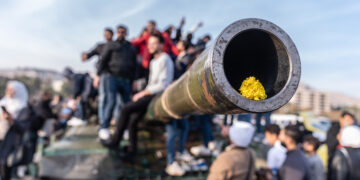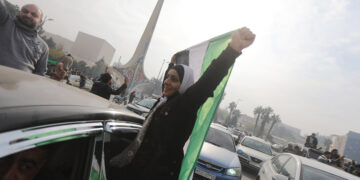DAWN Fellows From 17 Institutions Provide Expert Analysis on Middle East and U.S. Foreign Policy
(Washington, D.C., June 12, 2023) — Five regional experts have joined Democracy for the Arab World Now (DAWN) as its newest Non-Resident Fellows—Israeli human rights lawyer Michael Sfard, former U.N. Special Rapporteur Michael Lynk, Sudanese political analyst Kholood Khair, Iranian women's rights activist Sussan Tahmasebi, and Tunisian political researcher Mohamed Dhia Hammami—DAWN announced in a statement issued today.
They join a dozen other Non-Resident Fellows at DAWN whose expertise complements and advances the organization's mission, research and advocacy to promote democracy and reform U.S. policy in the MENA region. Like all of DAWN's fellows, Sfard, Lynk, Khair, Tahmasebi and Hammami will contribute to DAWN's online journal, Democracy in Exile, and offer insight, analysis and policy recommendations on behalf of DAWN.
"Each one of our new Non-Resident Fellows brings the best kind of expertise to DAWN: deep knowledge and unique perspective based on years of experience working across the Middle East and North Africa, whether as a human rights lawyer in Israel, a political researcher in Tunisia or Sudan, or an independent expert for the United Nations," said Frederick Deknatel, Executive Editor of Democracy in Exile. "While all of our Fellows pursue independent academic and policy work, they share DAWN's commitment to promoting democracy and human rights in the Middle East—and ending U.S. support for abusive regimes there."
Michael Sfard is a leading Israeli human rights lawyer and the author of The Wall and the Gate: Israel, Palestine, and the Legal Battle for Human Rights. A recipient of the Emil Grunzweig Human Rights Award and an Open Society Fellowship, he completed his law degree at Hebrew University in Jerusalem and his master's in international law of human rights at University College of London. He serves as the legal adviser to the Israeli organizations Breaking the Silence, Yesh Din, Peace Now and the Human Rights Defenders Fund, and he regularly represents Palestinian communities and Israeli and Palestinian activists in Israeli courts. His writing on the Israeli-Palestinian conflict and on human rights law has appeared in The New York Times, Haaretz, The Independent and Foreign Policy, among other publications.
Michael Lynk is Associate Professor at the Faculty of Law, Western University, in London, Ontario, where he has taught courses on labor law, constitutional law, and international and Canadian human rights law for more than 20 years. From 2016 to 2022, he served as the United Nations Special Rapporteur for the situation of human rights in the Palestinian territory occupied since 1967. As Special Rapporteur, he submitted a report to the United Nations Human Rights Council in 2022 concluding that Israel's occupation of Palestinian territory amounts to apartheid under international law. Lynk has authored and edited several books, including most recently Protecting Human Rights in Occupied Palestine: Working Through the United Nations (Clarity Press, 2022), co-authored with Richard Falk and John Dugard, and International Law and the Middle East Conflict (Routledge, 2011), co-edited with Susan Akram, Michael Dumper and Iain Scobbie.
Kholood Khair is a Sudanese political analyst and the founding director of Confluence Advisory, a "think-and-do" tank based in Khartoum. She is also a radio broadcaster, hosting and co-producing a weekly radio program, Spotlight 249, that is Sudan's first English-language political discussion and debate show aimed at Sudanese youth. Khair has over a decade of experience in research, aid programming and policy in Sudan and across the Horn of Africa. She has written for Foreign Policy, Al Jazeera English, The Tahrir Institute for Middle East Policy and other international outlets and organizations, and has been quoted widely as a political analyst in the media, including in The New York Times, The Washington Post, the BBC and NPR. She has master's degrees in African Studies from the University of Oxford and in Violence, Conflict and Development from SOAS University of London.
Sussan Tahmasebi is a women's rights and civil society activist and the Executive Director of FEMENA, an organization that promotes gender equality and supports women human rights defenders, their organizations and feminist movements in the Middle East and North Africa. She has been working to strengthen civil society and advocate for women's rights in Iran and the wider MENA region for over 20 years. She has worked in Iran at the national and grassroots level to address gender issues and women's rights and to strengthen and promote the role of civil society organizations. Tahmasebi is a member of the Advisory Committee for Human Rights Watch's Middle East and North Africa Division and a board member of the Doria Feminist Fund, which focuses on ensuring that grassroots women's groups in the MENA region have the resources necessary to advocate for women's rights. Tahmasebi has written widely on women's rights in Iran, and she is frequently quoted in news outlets on developments in Iran and the MENA region, including the BBC, France 24, The New York Times, The Guardian and many others.
Mohamed Dhia Hammami is a Ph.D. candidate in political science at the Maxwell School of Citizenship and Public Affairs at Syracuse University. His research focuses on the study of political elites through the lens of social networks in the MENA region. He has previously consulted for a wide range of organizations and initiatives, including Tunisia's Truth and Dignity Commission, the global peacebuilding charity International Alert, the international NGO Avocats Sans Frontières, and the Natural Resources Governance Institute. As a political analyst, Hammami has written for The Washington Post, Open Democracy and Jadaliyya, among other publications, and he has been widely quoted on Tunisian and Arab affairs, in Reuters, the Associated Press, Agence France-Presse, Bloomberg, The New York Times, the BBC and many other outlets.
"Michael Sfard and Michael Lynk will add indispensable depth and insight to DAWN's research and analysis of Israel's legal regime of apartheid and occupation," said Sarah Leah Whitson, DAWN's Executive Director. "Kholood Khair and Mohamed Dhia Hammami will vitally expand our expertise on Sudan and Tunisia, adding critical voices from both countries, while Sussan Tahmasebi brings to DAWN her years of unmatched experience studying and advocating for women's rights in Iran and the wider region."
DAWN's Non-Resident Fellows are available for interviews with the media. For topical inquiries based on each Fellow's area of expertise, please contact press@dawnmena.org.
DAWN, founded in 2018 by Jamal Khashoggi, is a nonprofit organization that promotes democracy, the rule of law and human rights for all the peoples of the Middle East and North Africa and advocates for U.S. policies that align with these goals.





































